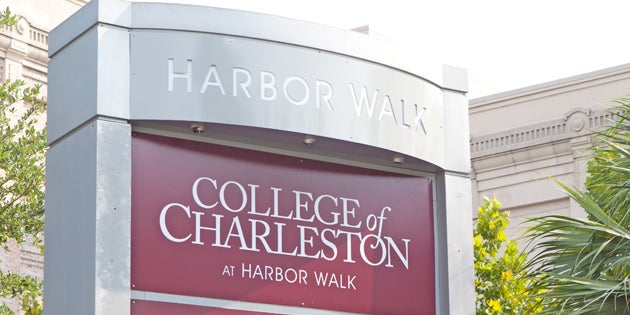As faculty and staff in the College of Charleston’s computer science program prepare to welcome students to the department’s new location at Harbor Walk for fall semester 2014, the program itself is thriving.
RELATED: Learn more about the College’s new Harbor Walk location.
 A record number of computer science majors graduated from the College in May 2014, reflecting the continued growth, popularity and competiveness of technology programs at the College.
A record number of computer science majors graduated from the College in May 2014, reflecting the continued growth, popularity and competiveness of technology programs at the College.
Since 2006, the College’s computer science program has seen its number of declared majors increase 10 to 16 percent year over year. For fall 2014, the program has roughly 350 undergraduates and about 30 graduate students.
Nearly 50 students earned computer science degrees from the College in May 2014, and many of them quickly entered a workforce that is desperate for their skills and willing to pay handsomely to employ them. Some of the College’s recent graduates who earned BS degrees in computer science have landed positions with starting salaries as high as $147,000 per year.
“It’s now socially acceptable to be a geek. Think Big Bang Theory,” said Chris Starr, chair of the computer science department. “Students are attracted to the number of jobs available and the high pay associated with those jobs.”
Primed for Growth
The Department of Computer Science has seen the largest growth in its computing in the arts (CITA) and data science programs. CITA combines creativity and computing in the same degree program. Employers in the entertainment and defense industries, among others, are looking for computer scientists who can both think creatively and codify their thoughts.
Data science is another burgeoning field as companies seek to monetize their vast repositories of corporate and social data. The Harvard Business Review has called the in-demand field of data science “The Sexiest Job of the 21st Century.”
Starr expects the data science field to continue growing, particularly as smaller companies begin to recognize the potential profitability of their data and look to data scientists to extract that value.
RELATED: Watch a video about a data science alumnus.
Predictions for the Industry
The U.S. Bureau of Labor Statistics estimates that 1.4 million new computer science jobs will be created by 2020. The College of Charleston is expanding and strengthening its computer science offerings to help meet the demand. The number of computer science majors at the College is expected to grow to as many as 500 students over the next few years, Starr said.
To support the program’s current students, faculty and staff and to provide for future growth, the computer science department has relocated to Harbor Walk, a commercial and retail center located in the Aquarium Wharf district of Charleston. The first classes in the new location begin in August 2014.
Another factor behind the interest in computer science education is the growth of free programming websites, coding academies and school programs.
As some high schools begin teaching mobile app development, Starr expects to see more software start-ups being developed by teenagers.
“What I’m most excited about seeing is computational thinking being recognized as a vital component of the liberal arts,” Starr said. “The possibilities are endless when a student is immersed in a highly technical degree program in the center of a liberal arts and sciences education.”
RELATED: Read about a College of Charleston professor’s new book on kids and coding.
A Talent Pipeline
 Located in Charleston’s emerging tech node known as “Silicon Harbor,” the College’s computer science program is well positioned to offer students an immersive learning experience. Students partner with faculty on research projects and gain hands-on experience through internships with local tech companies.
Located in Charleston’s emerging tech node known as “Silicon Harbor,” the College’s computer science program is well positioned to offer students an immersive learning experience. Students partner with faculty on research projects and gain hands-on experience through internships with local tech companies.
The department assists its graduates in starting their careers, and many computer science alumni are thriving in tech jobs in Charleston and around the country. Among the companies who have hired alumni are Facebook, Google, Pandora, Digital Domain, Yahoo Research, Amazon, Microsoft, Blackbaud, Benefitfocus and many other major technology companies.
By producing the software developers, designers and other creative problem solvers companies desire and by establishing private and corporate partnerships to expand its academic offerings, the department has developed a talent pipeline that contributes to the economic development of Charleston and South Carolina, said Starr.






